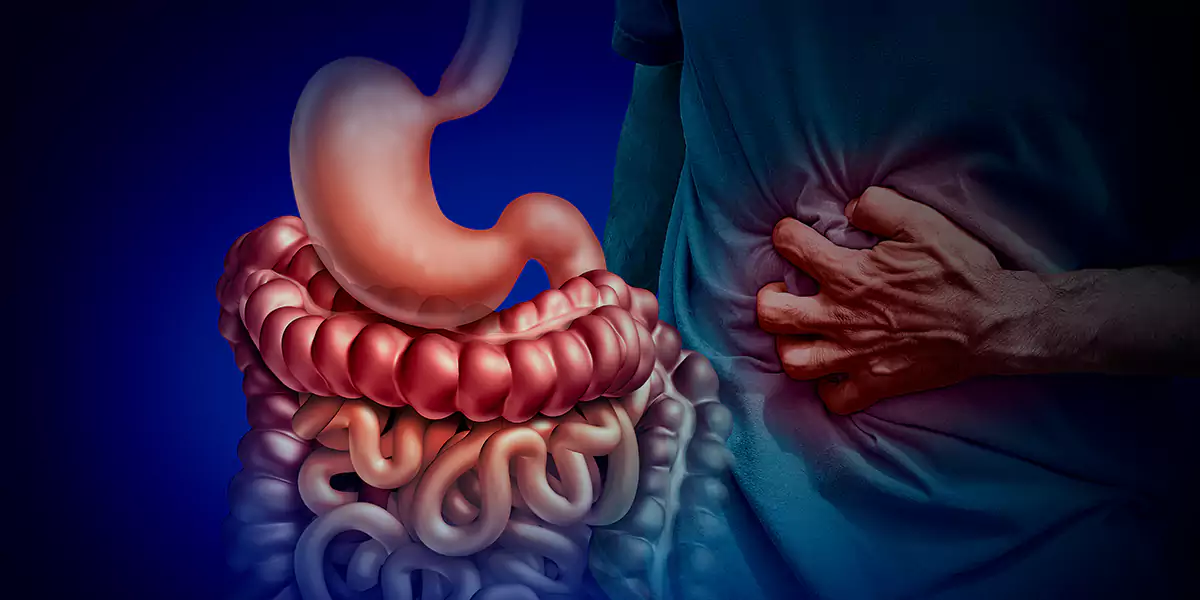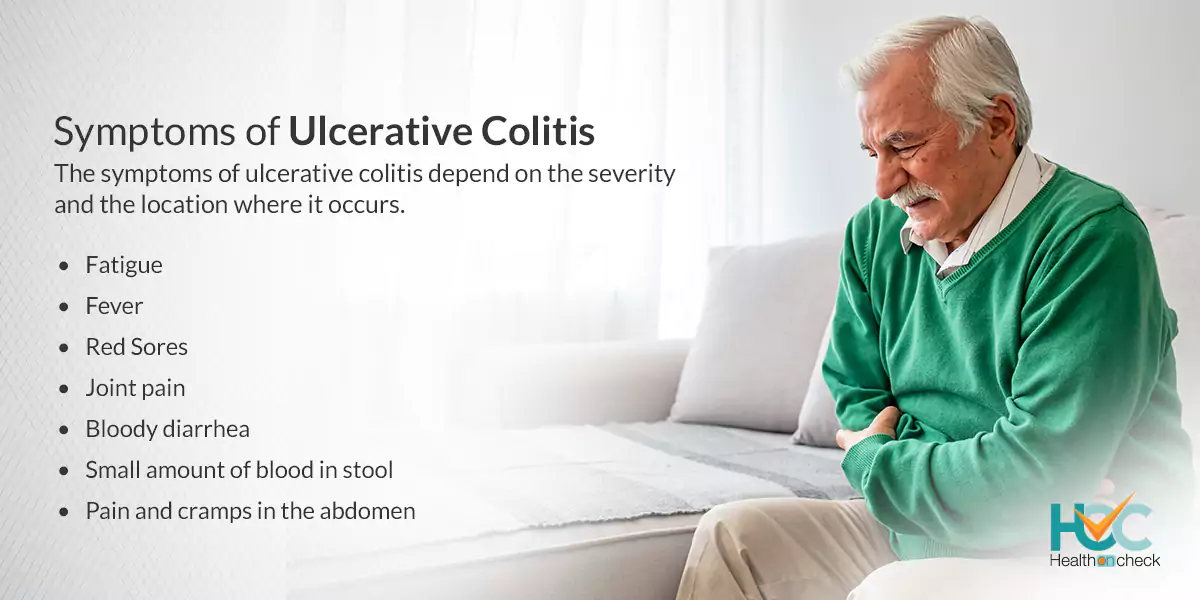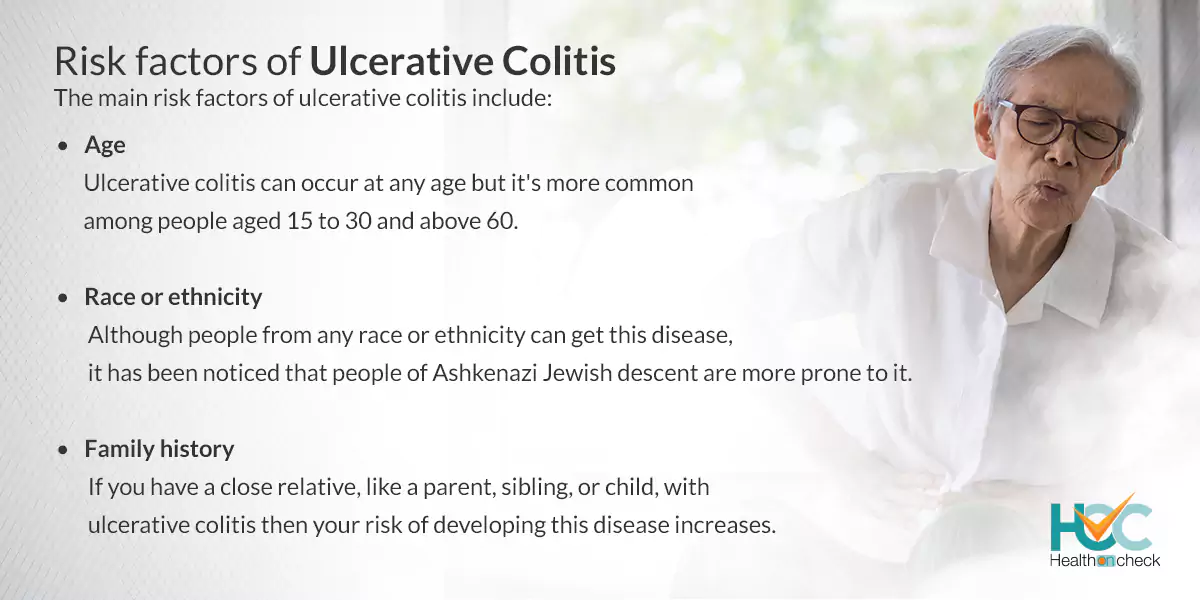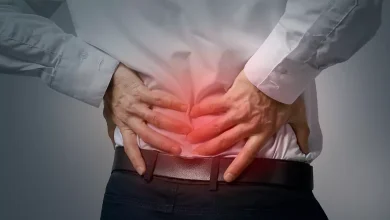All About Ulcerative Colitis

What is Ulcerative Colitis?
Ulcerative colitis is an inflammatory bowel disease that causes ulcers, irritation, and inflammation in the innermost lining of your large intestine (colon). It comes under the group of diseases known as inflammatory bowel disease (IBD). It’s a lifelong condition with no cure but treatments are available to manage the symptoms. In most people, symptoms generally develop gradually instead of suddenly. In the starting the inflammation begins in the rectum and slowly spreads to the colon and causes problems like diarrhea with blood, cramping, and urgency. The symptoms might be persistent or come and go. The severity of this disease is based on the location and the amount of inflammation.
What are the Types of Ulcerative Colitis?
Ulcerative colitis is classified according to its location. There are four types of ulcerative colitis including:
Ulcerative proctitis: It’s the mildest of all types and here the inflammation is limited to the area nearest to the anus, also known as the rectum. Rectal bleeding might be the only sign of this type of ulcerative colitis.
Proctosigmoiditis: Inflammation occurs in the lower end of the colon- the rectum and sigmoid colon. Bloody diarrhea, abdominal cramps and pain, and not being able to move the bowels despite the urge to do so are the main symptoms of this type.
Left-sided colitis: Inflammation spreads from the rectum up through the sigmoid and sloping parts of the colon. Bloody diarrhea, abdominal cramps and pain on the left side, and urgency to defecate are the main symptoms of this type.
Pancolitis: It mostly affects the whole colon area and leads to bloody diarrhea that might be severe, abdominal cramps and pain, tiredness, and unplanned weight loss.

What are the Symptoms of Ulcerative Colitis?
The symptoms of ulcerative colitis depend on the severity and the location where it occurs.
General symptoms of ulcerative colitis include:
- Bloody diarrhea
- Small amount of blood in stool
- Pain and cramps in the abdomen
- Rectal pain
- Constant urge to pass stool
- Unexplained weight loss
- Fever
- Fatigue
- There might be problems growing among children with this condition
- Loss of appetite
- Dehydration
- Red Sores
- Joint pain
- Anemia (reduced number of red blood cells)
What are the Causes of Ulcerative Colitis?
The exact cause of ulcerative colitis is still unknown but diet and stress are suspected to be factors that might play an important part in aggravating the condition but do not exactly cause it. Researchers believe that immune system malfunction might be a possible cause. The main work of the immune system is to protect your body from harmful germs and other substances. Sometimes the immune system mistakes food, good gut bacteria, and the cells that line your colon as intruders, and white blood cells that generally protect you start attacking the lining of your colon which leads to inflammation and ulcers.
Genetics might have some role as it has been noticed that ulcerative colitis is common among people who have a family history of this condition but most people with this disease don’t have a family history of ulcerative colitis.

What are the Risk Factors of Ulcerative Colitis?
The main risk factors of ulcerative colitis include:
Age: Ulcerative colitis can occur at any age but it’s more common among people aged 15 to 30 and above 60.
Race or ethnicity: Although people from any race or ethnicity can get this disease, it has been noticed that people of Ashkenazi Jewish descent are more prone to it.
Family history: If you have a close relative, like a parent, sibling, or child, with ulcerative colitis then your risk of developing this disease increases.
What are the Complications of Ulcerative Colitis?
Complications of ulcerative colitis might include:
- Severe bleeding while passing stool
- Dehydration
- A swiftly swelling colon, also known as a toxic megacolon
- A hole in the colon may occur. This condition is known as a perforated colon
- Risk of blood clots in veins and arteries increases
- Inflammation of the skin, joints, and eyes
- Risk of colon cancer increases
- Bone loss, also known as osteoporosis
How Ulcerative Colitis is Diagnosed?
The following procedures are helpful to diagnose ulcerative colitis
Blood tests: It helps to detect anemia or inflammation which causes ulcerative colitis.
Stool samples: A sample of your stool will be taken and sent to a lab for testing. It helps to rule out an infection or parasite in your colon. It also checks if there is blood in the stool which sometimes can’t be seen through naked eyes.
Flexible sigmoidoscopy: It allows your doctor to examine the lower part of your colon. A bendable tube into your lower colon will be placed through your bottom. There is a small light and camera on the end of the tube through which the doctor examines the colon. A small tool might be used to take a sample of the lining of your lower colon. This is called a biopsy where a doctor will examine the sample under a microscope in a lab.
Colonoscopy: This process is the same as flexible sigmoidoscopy, but here the doctor will examine your whole colon, not just the lower part.
X-rays: Though X-rays are not so common, in some special cases X-rays are taken to diagnose ulcerative colitis.
What are the Treatment Options Available for Ulcerative Colitis?
Ulcerative colitis is a lifelong condition and there is no cure for it but symptoms such as inflammation, and pain can be managed with proper treatment. Medicines are available to ease the symptoms. The aim of medications is to manage the symptoms so that you can lead a normal life. Various medications are prescribed by doctors to calm the inflammation.
Medication
Medicines given to patients of ulcerative colitis generally include:
Aminosalicylates: Your doctor may prescribe aminosalicylates for mild to moderate ulcerative colitis. This mainly includes sulfasalazine but if you are allergic to sulfa then your doctor might prescribe a sulfa-free aminosalicylate instead, like mesalamine. The medicines are available in the form of both pill form and enema or suppository form, which reach the inflammation low down in your colon or rectum in a better way.
Corticosteroids: Corticosteroids like prednisone or budesonide are given to patients with severe ulcerative colitis. Corticosteroids can have serious side effects, so they are given only for short-term use.
Immunomodulators: Your doctor might prescribe an immunomodulator. These medicines include 6-mercaptopurine, azathioprine, or methotrexate. They help to calm an overactive immune system.
Biologics: Biologics are given for moderate to severe ulcerative colitis. They target the parts of your immune system to slow it down. Medications such as infliximab, adalimumab, golimumab, certolizumab pegol, vedolizumab, and ustekinumab come under the category of biologics.
Janus kinase (JAK) inhibitors: Medicines including tofacitinib are given to stop the function of your body’s enzymes from triggering inflammation.
Surgery
If medications are not working to manage your symptoms or if you are facing complications, like bleeding or abnormal growths then surgery is recommended by doctors. Developing precancerous lesions, or growths can turn into colorectal cancer and in such cases, surgery is required. These lesions can be removed with surgery (a colectomy) or during a colonoscopy.
According to researchers, nearly 30% of people with ulcerative colitis require surgery at some point in their life. Nearly 20% of children with ulcerative colitis will require surgery during their childhood years.
Living with Ulcerative Colitis
Ulcerative colitis is a lifelong condition and you can have mild to severe symptoms throughout your life. If you have ulcerative colitis then you need to take utmost care of your diet as some foods flare up the symptoms. You have to give up foods such as greasy foods, food and drinks with high sugar, carbonated beverages,high-fiber foods, and alcohol. It’s also better to avoid salt and dairy products. You can manage the symptoms with medications and lead a normal and fruitful life. Around 30% of people with ulcerative colitis require surgery. You have to take medications as prescribed, even if you don’t have symptoms as skipping medications can lead to flare-ups and make it harder to manage the symptoms.
Whom to Consult?
If you experience a constant change in your bowel habits or if you have signs and symptoms like abdominal pain, blood in stool, diarrhea that is not responding to nonprescription medications, or an unexplained fever that lasts for more than a day or two then immediately contact your doctor. Even though ulcerative colitis is not fatal in most cases, if the conditions become severe it can turn into fatal. In some cases, it develops into cancer also, so it’s very important to take proper treatment to ease the inflammation and manage the symptoms.




